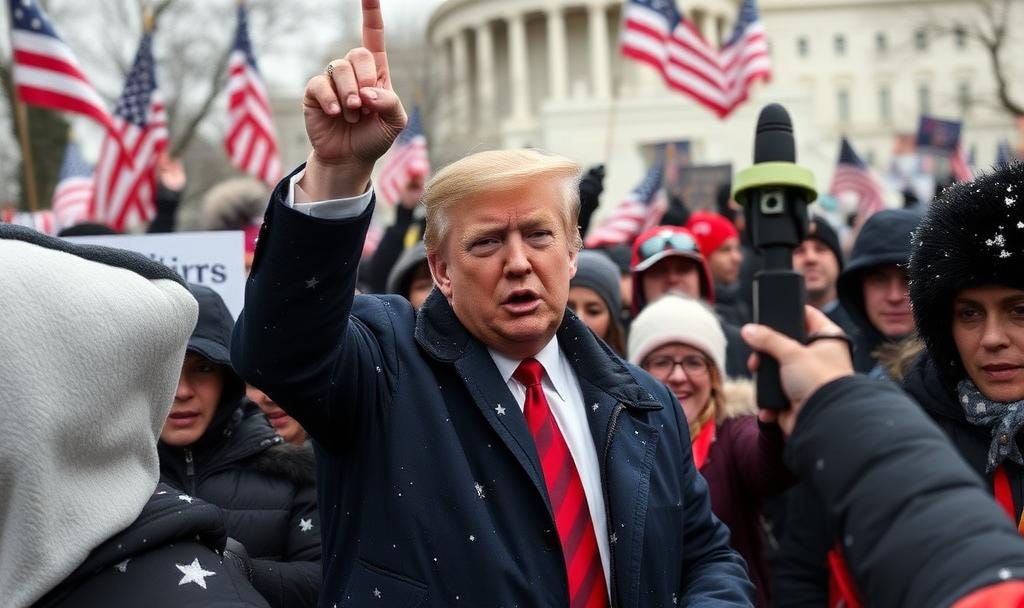Crisis of Trust: How the Willis-Wade Scandal and January 6 Lawsuit Expose Cracks in America's Justice System
In yesterday’s article, I highlighted how the Fani Willis charade, now being wrangled in by Fulton County Superior Court Judge Shukura Ingram by preventing Willis’ continued avoidance of service of subpoena, has had (and likely will continue to have) lasting effects on the portrayal of our justice system in the public eye for years to come.
In brief, Shukura ruled, "While we recognize that an appearance of impropriety generally is not enough to support disqualification, this is the rare case in which disqualification is mandated and no other remedy will suffice to restore public confidence in the integrity of these proceedings," referring to Fani Willis' alleged misconduct in Trump's ongoing election interference trial.
It has already created years-long impact, according to Greg Germain, a law professor at Syracuse University. "The Georgia election interference case is really stuck in the mud. It can't move forward against Trump until after he's out of office in four years," he quoted to Newsweek.
Now, in the make-or-break legal showdown over allegations that former President Donald Trump and his allies sought to overturn the 2020 election results in Georgia, the convergence of two seemingly distinct controversies underscores a profound crisis in public trust and judicial integrity. At the center of this drama are Willis’ undisclosed relationship with special prosecutor Nathan Wade, and a looming $50 billion class-action lawsuit spearheaded by more than 100 currently detained and incarcerated January 6 prisoners and their families.
First, the Class-Action Suit
Slated for the globally visible moments leading up to the January 20 inauguration of President-Elect Trump, is the announcement of the class-action suite led by Jake Lang, who’s been detained in federal prison since his arrest following the January 6, 2021 incident. The lawsuit, entitled the “January 6 Restitution and Wrongful Incarceration Lawsuit,” seeks compensation for alleged losses, including businesses, homes, careers, and emotional distress of the plaintiffs and their families, over being targets of what has been quoted as a "weaponized justice system."
The Willis-Wade Scandal: Undermining Judicial Integrity
Fani Willis’s position as the prosecutor in a politically charged trial carries immense weight, not only for the individuals involved but also for the broader trust in the justice system. However, her concealed romantic relationship with Nathan Wade, whom she appointed as a special prosecutor, has raised serious ethical concerns. This revelation came to light only during pre-trial proceedings, creating an opening for defense teams to question the objectivity and integrity of the prosecution.
While sympathizers decry the defense’s claims as rhetoric for delays, critics contend that this relationship, while personal, carries significant professional implications. Even if Willis and Wade acted without bias, the mere perception of impropriety has cast a shadow over the trial’s fairness. In a system that depends on public confidence, this appearance of conflict threatens to plant the aforementioned “weaponization” in fertile soil for both impending cases.
Strategic Fallout and Defense Maneuvers
In framing the prosecution’s credibility around the relationship as a conflict of interest, defense attorneys have filed motions for dismissal and recusal, claiming that the romantic involvement compromises decision-making and evidentiary processes. This line of attack not only delays proceedings but also weakens the prosecution’s ability to present a cohesive case to jurors.
More importantly for this case, though, are both the timing around a federal election and the main defendant, an incoming president.
The Georgia Court of Appeals’ decision this past week to disqualify Willis from the case has compounded these challenges. Such disruptions not only risk delaying the path to justice, they may also set a precedent for exploiting similar ethical breaches - highlighting the necessity of judicial balance in the first place.
January 6 Prisoners’ Lawsuit: A Parallel Battle
While the Willis-Wade controversy dominates headlines, the timing of the J6-ers’ class-action lawsuit is critical. It coincides with growing momentum among conservative groups and public figures who argue that January 6 defendants have been unfairly treated. Former President Trump’s pledge to pardon many of those convicted has further energized this movement. The Supreme Court’s June 2024 ruling, which found that an obstruction law used against several rioters was improperly applied, adds legal weight to the claims of those seeking restitution.
The Intersection of Trust and Polarization
Both the Willis-Wade scandal and the January 6 lawsuit expose a shared vulnerability: the fragile state of public trust in the justice system, with the weight of perceived misdirection on the left, and the calls for justice on the right. In cases of national significance, the public demands not only legal rigor but also the application of fairness and impartiality. No matter which party’s call rings truer, when personal relationships or allegations of systemic bias arise, they undermine this trust, echoing ripples public skepticism and political exploitation.
In Willis’s case, the weight of disregard the prosecution paid to the crucial element of judicial equity also impacted the substantive legal issues at stake. In that same vein, the January 6 lawsuit challenges the government’s handling of political dissent, framing the justice system as a tool of partisan retribution that benefited the Liberal Left over justice itself. Both controversies fuel narratives that the judicial process is driven by personal or ideological motivations rather than a commitment to the rule of law.
Implications for Public Perception and Policy
The overlapping timelines of these events create a broader crisis of confidence in the American judicial system. The January 6 lawsuit, with its unprecedented financial demands and claims of systemic abuse on national display, positions itself as a rallying cry for those who view the justice system as politically compromised - even at the local and state levels.
For policymakers and legal professionals, the totality of these events underscore the urgent need for transparency, ethical oversight, and structural reforms. Without clear boundaries and accountability, the outcomes of these cases threaten to further deepen political divisions in an already polarized landscape.




